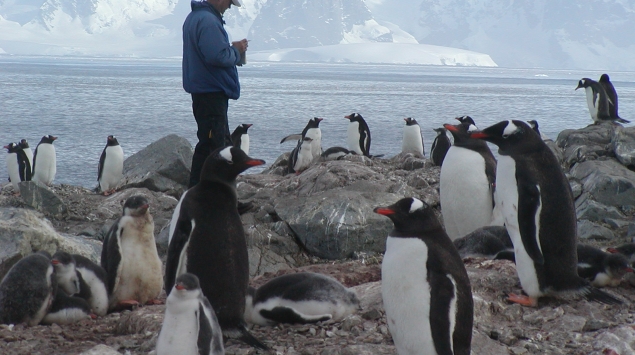Research Overview
PAL scientist Bill Fraser (Polar Oceans Research group, Sheridan, MT) with Gentoo penguins (Pygoscelis papua) at Biscoe Point, Antarctic Peninsula, January, 2002. PAL LTER.
The Long Term Ecological Research (LTER) program concentrates on studies of ecological processes that play out at time scales spanning decades to centuries. Long-term data sets from the LTER program provide a context to evaluate the nature and pace of ecological change, to interpret its effects, and to forecast the range of future biological responses to change.
NSF instituted the LTER program with a call for proposals in 1980 that resulted in the selection of six sites. The network has matured steadily, adding individual sites and shifting focus from individual site research to a broader synthetic view aimed at searching out general ecological principles that apply to many ecosystems at many different scales. In 2006, LTER formalized its governance structure with the establishment of a Science Council of all site principal investigators to plan and develop Network level science.
At each of the Network’s 26 sites there is an extraordinary amount of knowledge about the organisms and processes important at the site, about the way the site’s ecosystems respond to disturbance, and about long-term environmental change. A growing number of cross-site observations and experiments also have revealed much about the way that key processes, organisms, and ecological attributes are organized and behave across major environmental gradients.
As the LTER program approached its fourth decade, the Network challenged itself to develop additional advancements in Network science and a new kind of transdisciplinary science – one that ranges from local to global in scope, and that blends ecological and social science theories, methods, and interpretations in order to better understand and forecast environmental change. A set of research themes will be pursued over the next decade and beyond: future scenarios of change, inland climate change, the disappearing cryosphere, and coastal vulnerability. These research themes will be addressed with new long-term datasets, cross-site experiments, and modeling activities.




